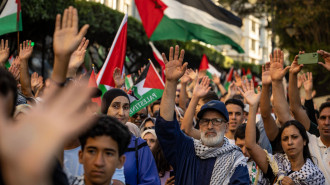Saudi scholar 'arrested' for criticising music concerts
Saudi authorities have arrested a religious scholar after he criticised Crown Prince Mohammed bin Salman's policy of hosting international music concerts in the country.
The Prisoners of Conscience rights group said on Tuesday that Sheikh Omar Al-Muqbil, a professor of Islamic law at Qassim University, was arrested after denouncing the policies of the General Entertainment Authority (GEA) as a threat to the kingdom's culture.
In a video, Al-Muqbil accused the GEA of "erasing the original identity of society".
"This is a continuation of the arbitrary arrests that have taken place in the kingdom for the past two years, which are aimed at leading scholars, sheikhs and other free thinkers," the Prisoners of Conscience group said.
In the past year a number of high-profile Western music stars including Mariah Carey, 50 Cent, Janet Jackson and Sean Paul have performed concerts in Saudi Arabia as part of Mohammed bin Salman's "liberalisation" drive that has led to new cinemas, concerts and sporting extravaganzas.
Twitter Post
|
The reforms, including an end to the decades-long ban on women driving and mixed gender concerts, are part of a sweeping economic plan, dubbed "Vision 2030", to direct the Saudi economy away from oil dependence and to create new jobs for an overwhelmingly young population.
But critics argue that the reforms are a distraction from a sweeping crackdown against critics of Mohammed bin Salman.
In September 2017, more than 20 influential clerics and intellectuals were detained for allegedly acting on behalf of "foreign parties".
Among those detained was reformist cleric Salman Al-Awdah, who was arrested on terrorism charges after posting a tweet calling for "harmony between people", which Saudi authorities claim was a call for reconciliation with neighbouring Qatar, who it had cut ties with.
Months later, shortly after announcing the end of a driving ban on women, bin Salman detained over 200 top Saudi officials and businessmen in a purported anti-corruption drive in the country.
Experts said it was a way of consolidating his grip on power by securing cash from 'shake downs' and eliminating potential rivals.
Riyadh has also faced international criticism over the brutal murder of journalist Jamal Khashoggi at the Saudi consulate in Istanbul in 2018.

![Palestinians mourned the victims of an Israeli strike on Deir al-Balah [Getty]](/sites/default/files/styles/image_684x385/public/2024-11/GettyImages-2182362043.jpg?h=199d8c1f&itok=xSHZFbmc)


![The law could be enforced against teachers without prior notice [Getty]](/sites/default/files/styles/image_684x385/public/2178740715.jpeg?h=a5f2f23a&itok=hnqrCS4x)
 Follow the Middle East's top stories in English at The New Arab on Google News
Follow the Middle East's top stories in English at The New Arab on Google News


![Left-wing candidate Jill Stein campaigns in Michigan in October [Getty]](/sites/default/files/styles/image_330x185/public/2024-11/GettyImages-2176828619.jpg?h=199d8c1f&itok=h2FXzBuP)